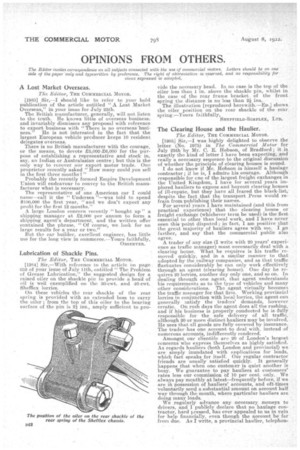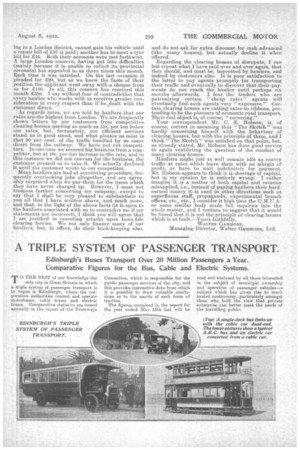OPINIONS FROM OTHERS.
Page 26

Page 27

If you've noticed an error in this article please click here to report it so we can fix it.
The side
Editor invites correspondence on all subjects connected with the use of commercial motors. Letters should be on one of the paperonly and typewritten by preference. The right of abbreviation is reserved, and no responsibility for views expressed is accepted.
A Lost Market Overseas.
The Editor, THE COMMERCIAL MOTOR.
[1983] Sir,—I Should like to refer to your bold publication of the article entitled " A Lost Market Overseas," in your issue for July 25th. The British manufacturer, generally, will not listen to the truth. He knows little of overseas business, and invariably dismisses any proposal with reference to export business with "There is no overseas 'busi ness.' He is not interested in the fact that the largest European. vehicle producer keeps 10 resident delegates overseas.
There is no British manufacturer with the courage, or the means, to devote 25,000-16,000 for the purpose of establishing a representative and stock in, say, an Indian or Australasian centre ; but this is the. only way to recover our export motor trade. One proprietor recently asked "How many could you sell in the first three months?"
Probably the recently formed Empire Development Union will endeavour to convey to the British manufacturer what is necessary. The representative of one American car I could name—call it the " Undersea "—was told to spend $100,000 the first year, "and we don't expect any profit for the first 12 months."
A large London concern recently "bought up" a shipping manager at ,2,000 per annum to form a shipping agent's department, and the written offer contained the phrase, " Of course, we. look for no large results for a year or two."
But the car builder, excellent engineer, has little use for the long view in commerce.—Yours faithfully, OBSERVER.
Lubrication of Shackle Pins.
The Editor, THE COmMERcIAT, MOTOR.
[1984] Sir,—With reference to the article en page 659 of your isSue of July llth, entitled " The Problem, of Grease Lubrication," the suggested design for a raised oiler on the shackle pin to provide a head of oil is well exemplified on the 30-cwt. and 40-cwt. Sheffiex lorries.
On these vehicles the rear shackle of the rear spring is provided with an extended boss to carry the oiler ; from the top of this oiler to the bearing surface of the pin is 2+. ins., amply sufficient to pro vide the necessary head. In no ease is the top of the oiler less than 1 in. above the shackle pin, whilst in the case of the rear frame bracket of the front . spring the distance is no 'less than 24 ins. The illustration [reproduced herewith.—ED.] shows the oiler position on the rear shackle of the rear spring.—Yours faithfully,
SHEFFIELD-SIMPLEX, LTD.
The Clearing House and the Haulier.
The Editor, THE COMMERCIAL MOTOR.
[1985] Sir,—I was highly delighted to observe the letter (No. 1975) in The Commercial Motor for July 25th 'by Mr. C. E. Hobson, of Bradford ; it is exactly the kind of letter I have been expecting, and really a necezsary sequence to the original discussion of whether the principle of clearing houses is sound.
I do not know if Mr. Hobson is himself a haulage contractor ; if he is, I admire his courage. Although responsible for cite of the largest freight exchanges in the United Kingdom, I have for several years implored hauliers to expose and boycott clearing houses of ill-repute, but they have all feared the black-list, despite the fact that the transport Press would refrain from publishing their names. For several years I have maintained (and this from practical experience) that the clearing house or freight exchange (whichever term be used) is the first essential to other than local work, and I have never seen this point disputed ; in fact, I am positive that the great majority of hauliers agree with me. I go farther, and say that the commercial public also agree.
A trader of any size (I write with 20 years' experience as traffic manager) must 'necessarily deal with a clearing house. What he requires is his traffic removed quickly, and in a similar manner to that adopted by the railway companies, and as that traffic fluctuates considerably he can only work effectively through an agent (clearing house). One day he requires 20 lorries, another day only one, and so on. In dealing through one agent, that agent understanda his requirements as to the type of vehicles and many other considerations. The agent virtually becomes the traffic manager for that firm. Working provincial lorries in conjunction with local-lorries, the agent can generally satisfy the traders' demands, however erratic. On rush days the agent does all the rushing, and if his business is .properly conducted he is fully responsible for the safe delivery of all traffic, although 20 or more distinct hauliers may be involved. He sees that all goods are fully covered by insurance. The trader has one account to deal with, instead of numerous accounts, indifferently rendered. Amongst_ our clientele are 20 of London's largest concerns who express themselves as highly satisfied. As regards hauliers (both London and provincial) we are simply inundated with eoplications for loads, which fact speaks for itself. Our regular contractor friends are usually satisfied quickly. It generally happens that when one customer is quiet another is busy. We guarantee to pay hauliers at customers' rates less our commission of 10 per cent. only. We always pay monthly at latest—frequently before, if we are in possession of hauliers' accounts, and oft-times voluntarily send a substantial amount on Recount half way through the month, where particular hauliers are doing many loads. We .regularly advance any 'necessary moneys to drivers, and I publicly declare that no haulage con. tractor, hard pressed, has ever appealed to us in vain for help financially, even though the account be far from due. As I write, a provincial haulier, telephon
bag in a London district, cannot gain his vehicle until a repair bill of £37 is paid ; another has to meet a tyre bill for 216. Both their accounts were met forthwith. A large London concern, having got into difficulties (mainly because it is unable to collect its provincial accounts) has appealed to us three times this month. Each time it was satisfied. On the last occasion it pleaded for £20, but as we knew the facts of their position the applicant went way with a cheque from us for £100. In all, this concern has received this month £350. I say without fear of contra-diction that every haulier who works with us receives greater consideration in every respect than if he. dealt with the customer direct.
As regards rates, we are told by hauliers that our rates are the highest from London. We are frequently shown letters by our customers from competitive clearing houses quoting as much as 15s; per ton below our rates, but, fortunately, our efficient services stand us in good stead, and what pleases us most is that RO per cent, of the traffic handled by us came direct from the railway. We have not cut competitors. In one case we secured big business from a competitor, but at 10s. per ton increase in the rate, and in this instance we did not canvass for the business, the customer pressed us to take it. We actually declined it until the customer wrote to our competitor.
Many hauliers are bad at acconnting procedure, frequently overlooking jobs altogether, and are agreeably surprised -when we pay them for the items which they have never charged up. However, I must not trespass further concerning my company, except to say that I shall be very pleased to substantiate to you all that I have written above, and much more, and that, in the light of the above facts (it is open to the hauliers associated with us to contradict me if my statements are incorrect). I think you will agree that I am justified in resenting attacks upon bona-fide clearing houses. We not only finance many of our hauliers, but, in effect, do their book-keeping also,
and do not ask for extra discount for cash advanced (like many houses), but actually decline it when offered.
Regarding the clearing houses of disrepute, I can but repeat what I have said over and over again, that they should, and must be, boycotted by hauliers, and indeed by customers also. it is poor satisfaction to the latter to pay agents promptly for transporting their traffic and eventually to discover that their payments do not reach the haulier until perhaps six months afterwards. I fear the traders who are patronizing certain "cheap rates" agents will eventually: find such agents very "expensive." Certain clearing houses are cutting rates to ribbons, pretending to he the pioneers of econornic,road transport. Their real object is, of course, " cornering."
Your correspondent Mr. C. E. Hobson, is, of course, correct in assuming that "The Skoteh " was hardly concerning himself with the behaviour of clearing houses, but with the principle of them, and I think The Skotch " was satisfied on that point, but, as already stated, Mr. Hobson has done good service in again ventilating the question of the conduct of many clearing houses.
Hauliers might just as well remain idle as convey traffic at rates which leave them with no nfargin of profit, or have to wait indefinitely for payment. -Mr. Hobson appears to think it is shortage of capital, but in my opinion he is entiiely wrong: I rather imagine it is a matter of both capital and revenne misapplied, i.e., instead of paying hauliers their hardearned money itis used in other directions such as superfluous staff, propaganda, experimental branch offices, etc., etc., I -consider it high time the C.M.U.A. or some similar body made full inquiries into the whole matter, and I venture to suggest that it would be found that it is not the principle of clearing houses which is at fault.—Yours faithfully,
WALTER GAMMONS,
































